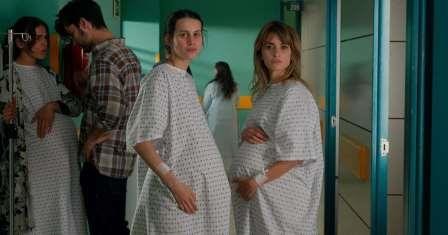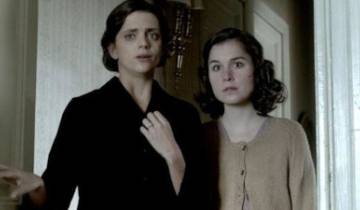
“Parallel Mothers” by Pedro Almodóvar
By Alejandro Varderi
Grade: 3
This recent film by the director from La Mancha oscillates between soap opera melodrama and ridicule of historical memory, through a plot where Janis (Penélope Cruz) and Ana (Milena Smith), two new mothers, discover that their daughters were switched at birth. The fact that Janis's great-grandfather disappeared during the Spanish Civil War gives the director the opportunity to seize a theme that, in the mannerism of his own style, loses its load of seriousness to fall into the banal and pamphleteer. .
The character of Arturo (Israel Elejalde), forensic archaeologist and circumstantial father of Janis's daughter, serves the director to connect both stories, making use of the copious recent literature on these issues in Spain. Assisted reproduction, motherhood and feminism, postpartum syndrome, on the one hand; and the use and abuse of the drama of those retaliated against and shot at the hands of politicians and technocrats, on the other, are mixed here in a superficial pastiche that artificializes the acting work, detracting from the credibility of the diegesis.
The temporary breaks, raccontos and gratuitous sets of shots and reverse shots densify the plot and leave many scenes unresolved, which dislodges the viewer, confronting him with events without development or reason. In this sense, the love scenes between Janis and Ana, for example, showing a sudden lesbianism, unexpectedly enter the script and disappear, leaving the relationship in the air. A relationship resumed, now only as friends, at the end of the film, which finds them happily adjusting to a new reality, where Janis and Arturo rehearse a life as a couple and Ana arrives in town, where all the characters meet to witness the opening of the graves of those shot, satisfied with her role as a young single mother.
And here it is interesting to highlight the emotional manipulation of the visible film in the staging of this scene; with the entire town and the protagonists at the front going to the graves, led by an actress as representative of Almodovarian kitsch as Rossy de Palma (Elena), Janis's friend, confidant and boss at the advertising agency where she works as a freelance photographer. The zenithal shot put to close the film, with the characters lying down inside the graves reproducing the positions as the corpses were left when they were thrown, constitutes the sum of the simulation and frivolization of the theme of historical memory, by favoring the narcissism of the camera about the seriousness of the drama surrounding this dark episode in Spanish history.
Other productions such as "Tacones distant" (1991) where the theme of motherhood also centered the action, this time from the conflictive relationship between mother (Marisa Paredes) and daughter (Victoria Abril), had a much more successful development, given how successful of the treatment of the story both at an acting and directorial level. The mastery and intensity of the performances of the protagonists was far superior, and the director's camera was able to capture with great success the atmosphere of hopelessness and apprehension leading to the dramatic climax. A climax that Parallel Mothers never reaches, leaving rather the plot knot submerged in an anticlimax, with an overacted Janis and an underacted Ana, which denied any possible rapport between the two.
The film is set in 2016 and opens with a montage of close-ups of Janis in a photo shoot with Arturo, showing the lack of financial support from the government of then President Mariano Rajoy for historical memory. With this, Almodóvar seems to settle the critical tone of the film and the importance of the photographic record (Janis's great-grandfather was also a photographer) within the plot. However, after a subsequent meeting between the two where Janis becomes pregnant, the film moves to the theme of single mothers (Janis and Ana share a room in the clinic where they are going to give birth) and the details of childbirth.
This is emphasized by the introduction within the diegesis of a fragment of a monologue from Federico García Lorca's work "Doña Rosita la soltera, o el idioma de las flores" (1935), performed by Teresa (Aitana Sánchez-Gijón), the mother, also alone, of Ana, with whom she also has a conflictive relationship, although little explored and without any resolution. The film then turns to Arturo receiving the news of Janis's pregnancy, and to his own dilemma in learning of a possible father out of wedlock when his wife was battling cancer.
From this point on, the film enters into a telenovela-like spiral of misunderstandings and misunderstandings where the racial theme acts as a trigger; Well, the supposed daughter of Janis, with mestizo features, has no place in her family tree, except for her father whom she never knew: "a Venezuelan with slanted eyes, very handsome." I argue that she does not convince Arturo and ends up leading Janis to suspect the girl. Upon taking her maternity test and discovering that she is not his daughter, he realizes her exchange with Ana's daughter, but when meeting with her, she informs him that the girl has died suddenly.
Janis's double trance is momentarily palliated by Ana's move to her house, beginning the young woman's sentimental education, from a neo-feminism ("We should All Be Feminists", reads Janis's shirt while she teaches her how to prepare an omelette. potatoes) that seeks to be comprehensive but remains inscribed as “well-rehearsed falsehood”, which is a distinctive feature of Almodovarian aesthetics; although she does not have here the lexical richness, nerve and ease characteristic of other films such as "The Law of Desire" (1987) and "Women on the Verge of a Nervous Breakdown" (1988).
The hybridity of "Parallel Mothers", halfway between commitment cinematography and woman's film, does not help to convince some always thorny and controversial issues, especially that of historical memory. Framing this production within it does not add but rather subtracts, especially for an alien or uninformed viewer; although it contributes to publicize it, but in a distorted way, which could be detrimental to the associations dedicated to rescuing the victims of the war and the Franco regime from oblivion.
"One day you have to come to town to see the house where we lived," Janis confidently points out, as she recounts for Ana the family history of women who emerged from war trauma, post-war intolerance and scarcity, and excesses of transition and democratic socialism. This sought to create an intergenerational bridge, where the real or imaginary return to the primitive and uncontaminated as opposed to the urban, was more dramatic than effective, unlike other productions such as "Entre tinieblas" (1983) and "Pain and glory" ( 2019). She is not surprised then that the character of Julieta Serrano, who acted in these two films, recovered with her monologue some of the strength and liveliness of the best Almodóvar, when recounting the night when her father was taken away. Here the director appropriated the memory contained in the real episode of Martin's rattle; the baby whose mother took her rattle when she was going to be shot, and that was recovered for him, 83 years after the assassination, when the grave where her body was found was opened.
The lack of empathy between Janis and Ana was exposed in the scene of the exchange of confidences, where the seduction of Janis by the teenager led to an erotic encounter that was more forced than desired, given the lack of sexual chemistry between them. However, the film insisted on articulating a couple's relationship with her ups and downs, jealousy and possessive attitudes; especially of Ana, counteracted by Janis by illustrating her, not only in the housework but in terms of her ignorance of the subject of historical memory. "You have to look to the future, the other only serves to open old wounds", she will settle this she. “It seems that in your family no one has explained the truth about our country to you,” Janis will maintain, urging Ana to a social and political commitment that she does not want to participate in, beyond what she feels in the relationship. When Janis then confesses the truth about their respective daughters, the film will be immersed in melodrama, but without the sharpness and ingenuity displayed in productions equally aimed at showing the tensions of affective threads, such as “Todo sobre mi madre” (1999). ) and “Back” (2006).
The last part of "Parallel Mothers" will leave Madrid for the town of Janis's family, who has resumed her relationship with Arturo, becoming pregnant again, and amending bridges with Ana. The happy family syndrome will be equated to the protocols of demarcation, excavation and recognition of corpses in the graves, delving, never better said, into the love-sociopolitical pastiche.
The contraposition of the tracking shot of the remains of those shot with that of relatives and neighbors observing them at the edge of the grave will end in a fixed shot of Ana's mestizo daughter. This will close the film with a note that seeks to be supportive, multicultural and inclusive. but it lacks the naturalness and spontaneity necessary to make it believable. The two high-angle shots of the assistants lying in the place where the bodies were followed by the zenith embracing the group before the final fade, in their mannerism and sensationalism offend more than support the cause of historical memory, insulting the victims and disrespecting their descendants: the corollary of a film that does not add to, but rather subtracts from, both the complexities of motherhood and the tears and horrors suffered by the victims of the war and the Franco regime.


